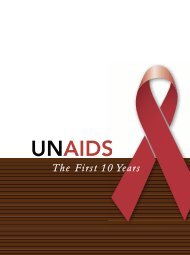Task Shifting - Global Recommendations and Guidelines - unaids
Task Shifting - Global Recommendations and Guidelines - unaids
Task Shifting - Global Recommendations and Guidelines - unaids
You also want an ePaper? Increase the reach of your titles
YUMPU automatically turns print PDFs into web optimized ePapers that Google loves.
<strong>Recommendations</strong> on creating an enabling regulatory environment for implementation<br />
Recommendation 6<br />
Countries should consider adopting a fast-track strategy to<br />
produce essential revisions to their regulatory approaches<br />
(laws <strong>and</strong> proclamations, rules <strong>and</strong> regulations, policies <strong>and</strong><br />
guidelines) where necessary. Countries could also<br />
simultaneously pursue long-term reform that can support<br />
task shifting on a sustainable basis within a comprehensive<br />
<strong>and</strong> nationally endorsed regulatory framework.<br />
Comment: This recommendation places high value on balancing the need for quality,<br />
protection <strong>and</strong> accountability with the urgency of the need to increase access to health<br />
services, including HIV services. Countries can use an incremental approach to produce rapid<br />
revision to the regulatory framework where necessary. Simultaneously, countries can pursue a<br />
full <strong>and</strong> thorough approach to regulatory reform which can be undertaken at a slower pace.<br />
Summary of findings<br />
Countries that chose to adopt the task shifting approach as a response to severe shortages of<br />
human resources for health alongside a high HIV burden will want to move fast with<br />
implementation. From a pragmatic point of view, the objective is to exp<strong>and</strong> the pool of human<br />
resources for health in order to increase access to a range of health services including those for<br />
HIV. To achieve this aim, while also ensuring the necessary levels of quality, protection <strong>and</strong><br />
accountability, appropriate regulation must be put in place at a pace that does not delay the<br />
expansion of service provision any longer than is necessary.<br />
Changes in scope of practice can take place quickly in some cases . However, they may also be<br />
slow because of the policy <strong>and</strong> legislative processes involved 86 . In such situations there may be<br />
alternative strategies, such as the use of existing public health emergency responses, that take<br />
less time <strong>and</strong> that countries could use to facilitate the rapid implementation of task shifting.<br />
In some countries, task shifting may already be taking place in an informal capacity as an<br />
emergency response to health workforce shortages 55 56 94 95 . In such cases, countries will need to<br />
consider fast-track strategies which can quickly formalize the evolutions of roles <strong>and</strong> scopes of<br />
practice that have already been achieved. These strategies could involve relatively small revisions<br />
to policies <strong>and</strong> guidelines or could call upon regulatory approaches that already exist <strong>and</strong> are<br />
permissive.<br />
However, more comprehensive reform of a country’s regulatory framework could also have<br />
advantages. Many countries retain models of health-care regulation that no longer provide the<br />
coherence or flexibility required to fully meet the needs of current health-service delivery systems.<br />
The adoption of the task shifting approach could provide an opportunity to adapt regulations in a<br />
way that would help to strengthen not only HIV services but also the wider health-care system. If<br />
task shifting is to be sustained in the long term, comprehensive reform of the regulatory<br />
framework may well be needed.<br />
It is interesting to note that a study undertaken in high-income countries concluded that task<br />
shifting can be developed to the greatest extent if systems have permissive frameworks wherein<br />
the law allows for broad definitions of scopes of practice 98 . For example, the roles <strong>and</strong> range of<br />
activities of nurses are more extensive in health systems such as that in the United Kingdom<br />
where their scope of practice is defined by law in a broad sense rather than by a list of tasks.<br />
23

















